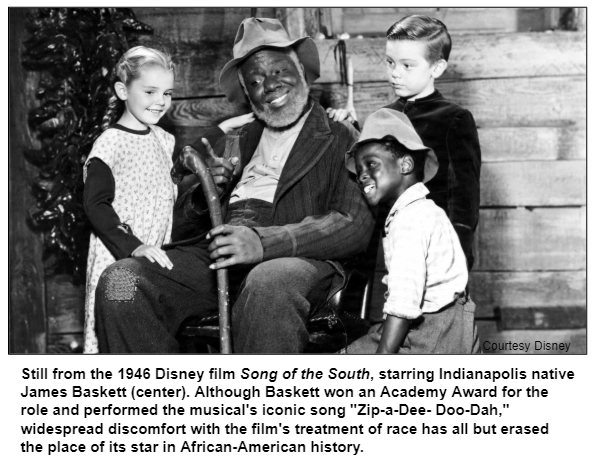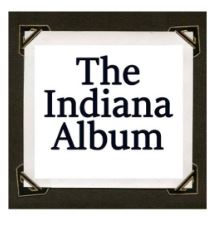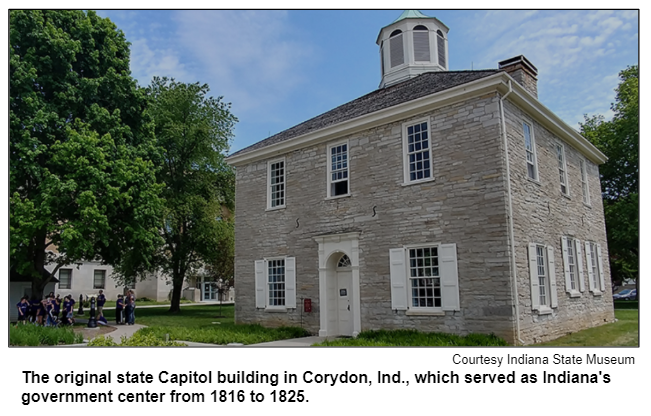Saturdays, noon to 1 p.m. ET on WICR 88.7 FM.
Or stream audio live from anywhere on WICR Online!
July 3, 2021
The legacy of Indy native James Baskett and Song of the South - encore
Even specialists in African-African history could be forgiven for drawing a blank at the mention of the name of Indianapolis native James Baskett. In spite of being the first black male actor to win an Oscar - for a role in which he sang a song that also won an Academy Award - Baskett's place in the annals of African-American history seems to be largely forgotten.

And not without good cause. Film critics and historians have condemned the film's sweetly nostalgic portrayal of the social hierarchy of Reconstruction-era South. As Guardian film blogger Xan Brooks put it recently, "the film trades in a dubious form of myth-making - implying that African-Americans stuck below the Mason-Dixon line were a cheerful bunch who liked nothing better than going fishing, spinning tall tales and looking after white folks' kids."
The very title of the film and its focus on song can be viewed as perpetuating a racist myth. As 19th century abolitionist Frederick Douglass - who himself escaped slavery - commented, the singing of enslaved people in the Southern United States was not evidence of their contentment or happiness.
"It is impossible to conceive of a greater mistake," Douglas wrote. "Slaves sing most when they are most unhappy."
 But does the film deserve to be virtually banned, especially when a novel like Gone with the Wind and its 1939 film adaption - with all their racial stereotyping, glorification of white privilege and perpetuation of the myth of the "happy slave" - are still held up as classics?
But does the film deserve to be virtually banned, especially when a novel like Gone with the Wind and its 1939 film adaption - with all their racial stereotyping, glorification of white privilege and perpetuation of the myth of the "happy slave" - are still held up as classics? Does Song of the South have anything to offer the modern viewer? Does the legacy of Hoosier James Baskett deserve to be reevaluated?
These are the questions explored by Hoosier History Live associate producer and guest host Mick Armbruster in this encore of a show that first aired in January of 2020. Mick is joined in studio by two guests:
- Film historian Eric Grayson, who specializes in the collection and preservation of vintage films;
- and Ophelia Wellington, director of Freetown Village, a living history museum she founded in 1982 out of a desire to teach African-American history.
The show also looks into how Baskett's portrayal of the Uncle Remus character might teach us something about the role of folklore in African-American culture, and explore how the content of his tales - with their focus on the archetypal trickster Brer Rabbit - can be traced back to folklore found among native cultures in Africa.
And while the discussion may not leave listeners whistling "Zip-a-Dee-Doo-Dah," we hope it does give them an appreciation of the legacy of Hoosier James Baskett and a more nuanced understanding of the film he starred in.
Roadtrip: Corydon in Southern Indiana
Guest Roadtripper Jeff Kamm, author and 5th Grade and Music Teacher at Plainfield Community School Corporation, invites us to travel to the southern border of the Hoosier state - and go back in time 200 years - to visit Corydon, Ind.
As Jeff explains, Corydon was founded in 1808 and served as the capital of the Indiana Territory from 1813 until the milestone year of 1816, when Indiana became a state. The town's status as state capital lasted only until 1825, however, when that designation shifted north to Indianapolis.
While visiting Corydon, Jeff suggests you explore the historic Corydon Capitol building that served as the original Statehouse from 1816-1825. You can also check out the Constitution Elm, where delegates drafted Indiana's first state constitution. The tree has long since died, but the trunk has been preserved and encased in a large sandstone monument.
Civil War buffs will want to visit the site of the only Civil War battle fought in Indiana; along with Gettysburg, it's one of only two Civil War battlefields on Northern soil. The Battle of Corydon Memorial Park is located just south of town and remains largely unchanged from when the battle was fought in July of 1863, when Morgan's Raiders crossed the Ohio River into Indiana and continued their way northeast into Ohio.
Don't miss this step back in time with Jeff!
Questions about our organizational structure?
Hoosier History Live is a small, independent production group and is run as a small business. We have had a lot of challenges over the years because we do things well and also ask for money to support our work. We have kept the ship afloat, although it has been difficult. We intend to hold on to our unique media voice. Furthermore, we believe we are the only live talk show with call-in about a state's history.
Think of us as a small newspaper, except that we are multi-platform. In addition to a live radio show, we offer podcasts, social media, weekly newsletter and a detailed website with an extensive, searchable archive. And think of how many media outlets are shrinking or disappearing!
This means that we sell sponsorship, which includes logos and links, as well as voiced credits in the live show and in podcasts. For individual contributors, this means helping to support the performers, researchers and editors who work so hard each week. Financial support also helps to pay for our website, newsletter, computer storage, and other tech costs. Any of this can be discussed with our producer; she can be contacted at molly@hoosierhistorylive.org.
But our biggest asset is labor; the very bright and talented people who work on the project. All of our team has a passion for doing things well.
Hoosier History Live seeks to hire part-time editor on a contractual, hourly basis
We need additional editing help! We are looking for someone who edits audio, as we need help with editing our encore shows and podcasts. It's also a big help if you love history, know how to write well and can also do voice-over work.
We also need help with editing our website and newsletter, both of which are expansive. We need people who are self-starters and responsible, who are excited about our unusual project and would like to be part of a creative team.
The show, newsletter and podcasts do not just mysteriously appear out of thin air! There is a lot of work done behind the scenes.
For more specifics about our editing position or positions, email our producer at molly@hoosierhistorylive.org.
Nelson Price, host and historian
Molly Head, producer/general manager, (317) 927-9101
Mick Armbruster, associate producer
Cheryl Lamb, administrative manager
Richard Sullivan, senior tech consultant
Pam Fraizer, graphic designer
Garry Chilluffo, consultant
Please tell our sponsors that you appreciate their support!

 For organizational sponsorship, which includes logos, links, and voiced credits in the show and in podcasts, email molly@hoosierhistorylive.org, or call (317) 927-9101 for information. Our podcast listens are increasing and we are being distributed on Indiana Memory and the National Digital Public Library. Grow with us as our podcast and internet presence expands! Thanks also to Visit Indy, Fraizer Designs, WICR-FM, Henri Pensis, Genesis Brown, Kielynn Tally, Heather McIntyre, Justin Clark, and many other individuals and organizations.
For organizational sponsorship, which includes logos, links, and voiced credits in the show and in podcasts, email molly@hoosierhistorylive.org, or call (317) 927-9101 for information. Our podcast listens are increasing and we are being distributed on Indiana Memory and the National Digital Public Library. Grow with us as our podcast and internet presence expands! Thanks also to Visit Indy, Fraizer Designs, WICR-FM, Henri Pensis, Genesis Brown, Kielynn Tally, Heather McIntyre, Justin Clark, and many other individuals and organizations.
Thank you!
We'd like to thank the following recent, new and renewal contributors whose donations help make this show possible!
- David Yount
- Tom Swenson
- John Stanton
- Kathleen Angelone
- Tim and Meg Shelly
- Ann Frick
- Dr. William McNiece
- Michael Freeland and Sharon Butsch Freeland
- David E. and Lynne J. Steele
- Greg Larson
- Ryan Zumbahlen
Copyright 2021
|







